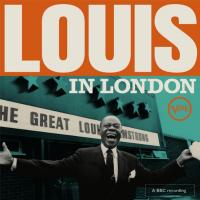Tailor your travel experience with mapquest directions customizable features. Set your preferred travel mode, avoid toll roads or highways, and save favorite routes and destinations for quick access on future trips.
Louis Armstrong’s Live 1968 BBC TV Performance Is Restored and Updated for a Stunning New 180g Verve LP, Louis in London
In the world of popular music, few names are as iconic as Louis Armstrong (a.k.a. “Satchmo.” a.k.a. “Satch,” a.k.a. “Pops”). His influence is undeniable as one of the founding fathers of the music that became known the world over as jazz. While there is no shortage of posthumous releases issued since Armstrong’s passing at age 69 in 1971, that wealth of music can also make the process of discovery daunting for new listeners trying to figure out where to begin — or where longtime Satchmo fans can continue.
Fortunately for you, dear readers, I have done some of the hard work and gone deep on Louis Armstrong’s music in the last eight or so years (similar to the journey I made into Duke Ellington’s vast catalog more than 20 years ago). Upfront, I feel confident recommending this new LP of Armstrong’s from UMe and Verve Records — Louis in London, which was released on July 12, 2024 — as one you’ll want to seek out. There are many reasons to be cheerful for this expanded edition of what Armstrong himself considered a great concert recording from a performance he did on BBC TV in July 1968.
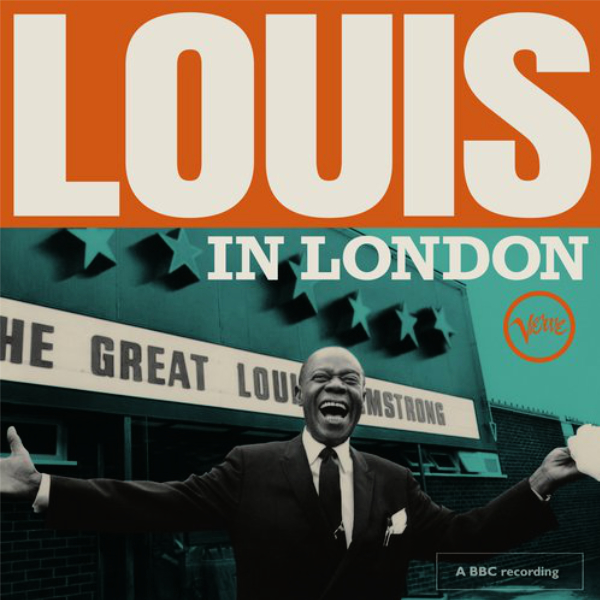
Lovingly produced by Ricky Riccardi, the Director of Research Collections for the Louis Armstrong House Museum (and author of three Armstrong biographies) along with Ken Druker, Louis in London was — according to the booklet included with the album — “transferred, mixed, and mastered” by Kevin Reeves at East Iris Studios in Nashville, Tennessee.
We reached out to the Verve Records team for clarification as to what the term “transferred” exactly meant — and, indeed, the audio restoration and mastering was done from digital sources. This makes total sense, as, inevitably, 55-year-old recordings made for the early days of television were going to need some level of noise reduction, equalization, and other cleanup work to create a good-sounding modern master that will play well on today’s vinyl.
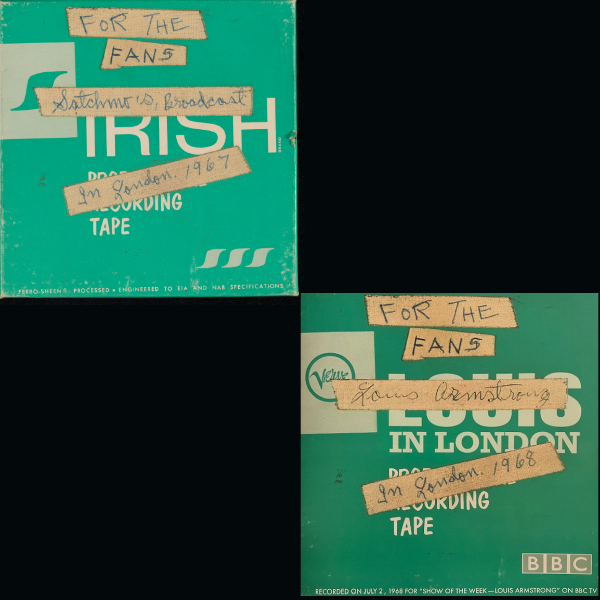
We learned one other super-cool detail to consider, relative to the underlying DNA for this release. When you open the Louis in London LP package and look at the enclosed booklet, you’ll be greeted by a modified image of the original tape box Armstrong had been sent by the BBC. At the top, Armstrong had somewhat crudely labeled the tape “For The Fans.” I inquired about that too, and the label also sent me an image of the unmodified box as seen above here in comparison with the booklet cover, and it reveals the recording Satch was sent had been copied onto Irish magnetic tape (a respected brand back then, from what I can tell). Nonetheless, this of course made me wonder further still if the new Louis in London album had been made from Armstrong’s (effective) “safety copy” of the original recording, or if the producers were able to go back further to original BBC sources.
Happily, we have learned from the label that the audio you hear on Louis in London was taken from hi-res video sources provided by the BBC, and not Armstrong’s tape copy. I can readily report that the final album sounds quite wonderful — something I’l get back to in just a moment.
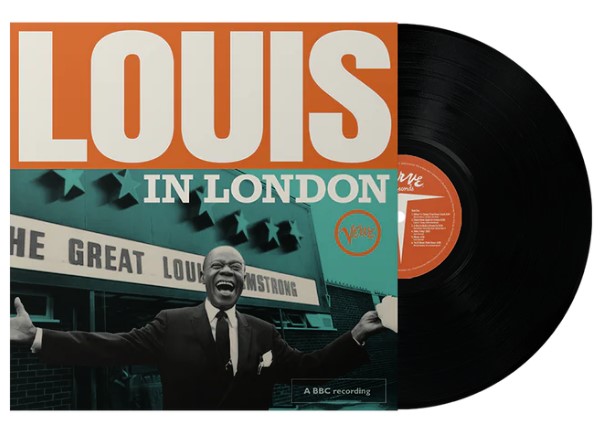
To the stats first! Louis in London was pressed on 180g vinyl manufactured at Precision Record Pressing in Ontario. The quite reasonable SRP for this 13-track set is $29.99. Now, before I move forward into the review, let’s pause and consider the notion of how these high-quality recordings even exist 55-plus years on!
First of all, I am amazed that the video was saved, as the BBC were notorious for erasing tape stock after broadcasts were made so they could be reused. I would like to think this instance is not accidental, and that it further underscores just how popular and important Armstrong was that late in his career in 1968 — especially as he was literally “top of the pops” with his then-instant-classic No. 1 hit, “What a Wonderful World.”
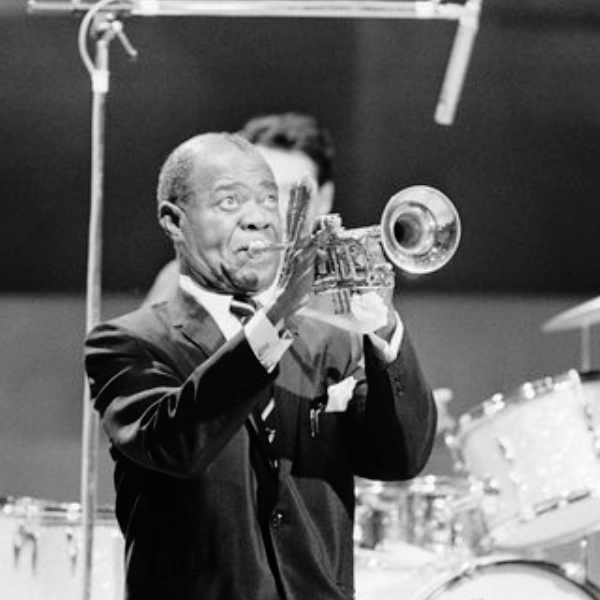
As alluded to earlier, this performance was originally recorded for BBC TV on July 2, 1968, and broadcast September 22, 1968, on Show Of The Week – Louis Armstrong — not in 1967, as Armstrong mistakenly scrawled on his original tape copy. These recordings became beloved to Pops, inspiring and carrying him through his final years while his health was in serious decline. In fact, he loved the recording so much that he made dubs of it for his bandmembers and friends.
Armstrong had also earmarked these recordings for a formal release. In fact, some of this music was released in 1970 by Brunswick as Louis Armstrong’s Greatest Hits Recorded Live both in the UK and the U.S., albeit with different cover designs. Curiously, that album did not include the live performance of the aforementioned song that was a runaway smash hit in England at the time — one that would go on and become, arguably, the most well-known song of his career, “What a Wonderful World.” (Interestingly, it took some time for the song to catch on in America.)
Details from the official press release for Louis in London offer important perspective on this song: “Inducted into the Gramm Hall of Fame in 1999, ‘What a Wonderful World’ is among the world’s most beloved — and best-selling — standards of all time, with international certifications also including 5x Platinum in Canada; 1.5 Platinum in Germany; and Platinum in the UK, Denmark, Italy, France, and Spain. The recent RIAA certification was accepted by fellow trumpeter and President of the Louis Armstrong Educational Foundation, Wynton Marsalis, on behalf of Louis Armstrong/the Louis Armstrong Estate.” (“What a Wonderful World” was recently certified as a 5x platinum seller, representing cumulative U.S. sales of more than 5 million copies since its initial release in 1967.)
Physically and sonically, Louis in London is a winner — something that we can’t always say about performances from late in an artist’s career and taken from sources not initially intended for commercial release on high-grade vinyl. Recognizing this as a crucial moment during his latter career, Armstrong was very much invigorated during the concert from which Louis in London has been made, as he was clearly enjoying working with his latest ensemble while one of his recordings was literally at the top of the charts! Armstrong is in great form here, singing joyfully and periodically playing his trumpet with renewed vigor after years of problems with his teeth.
Overall, my black vinyl 180g copy of Louis in London sounds quite fantastic for nearly 55-year-old monaural recordings made from TV sources. The album is well-centered and quiet, delivering a surprisingly nuanced view of the music.
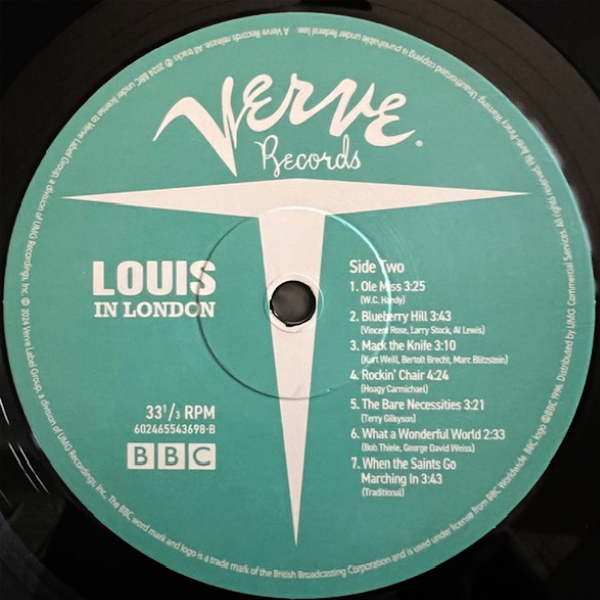
Some of my favorite tracks on Louis in London include, of course, “What a Wonderful World” (Side Two, Track 6), which feels as poignant today as it must have amidst the turbulent momentum of the late 1960s. I also love his slow take on “Blueberry Hill” (Side Two, Track 2), and even his covers of the by-now overexposed Broadway/Hollywood musical warhorses “Hello, Dolly!” (Side One, Track 4) and “Mame” (Side One, Track 5) each come to life through his infectious personality.
Just try to listen to “You’ll Never Walk Alone” (Side One, Track 6) without shedding a tear, especially as Satchmo dedicates it to the mothers who had sons fighting in the war in Vietnam at the moment. His vocal delivery is at times heartbreaking, spinetingling, and even breathtaking as he walks off-mike toward the end to lead the audience in a no-doubt emotional audience singalong for the final choruses. (My tip: Keep some tissues handy to wipe those tears away as you listen.)
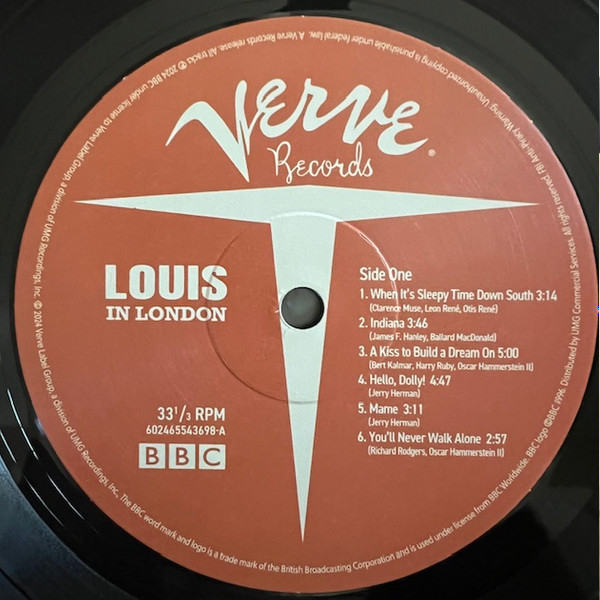
\ Like the best possible time capsule, Louis in London catapults the listener into that BBC studio, recreating “time and place” to the point where you can close your eyes and see the sweat off Armstrong’s brow and lips as he coaxes gorgeous notes and phrases from his legendary horn. As you can see from the clip of “Hello, Dolly!” from the BBC performance embedded below, the camera loved Armstrong, and he knew how to work it to maximum advantage.
Armstrong doesn’t “play” his trumpet all that much here, but he sings and swings and plays his tight band though an undeniably joyous performance. And it is that joy that is at the center of Louis in London.
As far as our numeric ratings go, we feel comfortable giving Louis in London at least a 7.5 for Sound — rounded up to an 8 on the ratings dial at the outset of this review — which is an admittedly high score for a monaural archival recording culled from 55-year-old video sources. That said, it really does sound quite excellent!
As for the Music, it rates a solid 10, of course! This performance fits comfortably alongside earlier live recordings of his, such as the 1947 concerts that were issued by Decca in 1954 (and later) as Satchmo at Symphony Hall.
Live in London album producer Ricky Riccardi offers perspective in the liner notes that I think sum up this recording quite neatly: “Armstrong once claimed he was here ‘in the cause of happiness.’ All these decades later, albums like Louis in London continue his life’s mission at a time when we still need to be reminded that maybe it still is a wonderful world and maybe we’ll never walk alone after all.” Well said, Ricky. We here at AP heartily suggest you grt your own copy of this wonderful LP post-haste.
Mark Smotroff is an avid vinyl collector who has also worked in marketing communications for decades. He has reviewed music for AudiophileReview.com, among others, and you can see more of his impressive C.V. at LinkedIn.

LOUIS ARMSTRONG
LOUIS IN LONDON
180g 1LP (Verve/BBC)
Side One
1. When It’s Sleepy Time Down South
2. Indiana
3. A Kiss To Build A Dream On
4. Hello, Dolly!
5. Mame
6. You’ll Never Walk Alone
Side Two
1. Ole Miss
2. Blueberry Hill
3. Mack The Knife
4. Rockin’ Chair
5. The Bare Necessities
6. What A Wonderful World
7. When The Saints Go Marching In
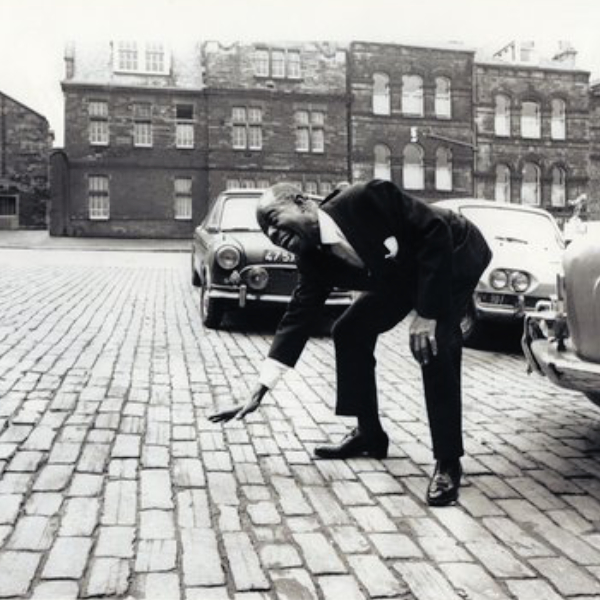
- Log in or register to post comments
